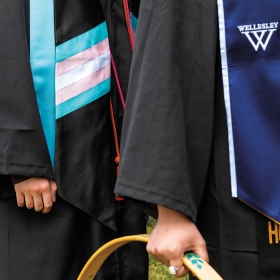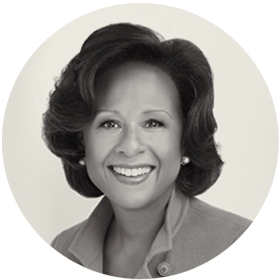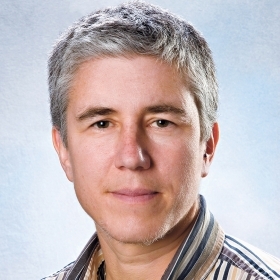Early in 2023, in between completing the requirements for their math major and training with Wellesley’s crew team, Charlie (a pseudonym) considered what they wanted to accomplish before graduating in May.

Early in 2023, in between completing the requirements for their math major and training with Wellesley’s crew team, Charlie (a pseudonym) considered what they wanted to accomplish before graduating in May. “I was thinking about the things I liked about Wellesley, the things where I feel like Wellesley as an institution has failed, and, with my one semester left, what can I do to make it better?” says Charlie, whose gender identity is nonbinary.
One of Charlie’s best friends is an environmental activist who took ES 199/ECON 199: Fossil Fuel Divestment: Student Action at Wellesley in fall 2020. Students in that course wrote a nonbinding College Government ballot initiative on whether the College should divest from fossil fuels, which included a number of carbon-reducing recommendations students could adopt. The student body voted on and approved the initiative in March 2021 (see “Wellesley Takes a Stand on Climate Change,” summer 2021). That gave Charlie the idea to create a nonbinding ballot question calling for policies to make the College more inclusive for its transgender and nonbinary students. Charlie knew a ballot question would not change College policies, but they hoped that, as with the divestment ballot initiative, it would demonstrate student sentiment to the Wellesley College Board of Trustees.
Charlie is part of a diverse community of nonbinary and transgender students at Wellesley. In a 2022 Pew Research Center survey on gender identity, about 5% of respondents between 18 and 29 reported being trans or nonbinary. (Wellesley does not have data on the size of this student population at the College.) Around the country, it’s a community that is gaining visibility, and it’s also facing anti-trans legislation in an increasing number of states.
In 2015, the board of trustees reaffirmed the College’s mission as a women’s college and expanded the admission policy on eligibility to include “any applicant who lives as a woman and consistently identifies as a woman” including trans and nonbinary people. The policy also stated that “Wellesley will use language reflective of its identity as a women’s college, i.e., female pronouns and other gendered language, in all institutional communications.”
In February, Charlie and about half a dozen students, representing a range of gender identities, wrote a ballot question challenging aspects of Wellesley’s admission policy. It included two proposals: first, using gender-neutral language, like “students” or “alumni” instead of “women” in all Wellesley College communications; and second, adopting an admission policy that is open to all transgender and nonbinary students, including those who identify as transgender men. Charlie describes these proposals as “opening our arms a little bit further. … We want to make these changes to recognize the student body that is already at Wellesley. There are already nonbinary students at Wellesley. There are already trans men at Wellesley.”
[substory:1]
In the March 14 election, a majority of students who voted supported the proposed policy changes. Due to a longstanding rule, the College did not release the percent with which it passed. However, the Committee for Political Engagement, a nonpartisan College Government committee, emailed a poll to the student body through which they could anonymously report how they voted. About 35%, or 849, of the students CPE emailed took the poll; of those, 90.1% said they voted in favor of the ballot question, 7.7% voted against it, and 2.2% abstained.
Ahead of the election, President Paula Johnson sent an email to the campus community regarding the ballot question. She wrote that the results would not have an impact on any of the policies or practices of the College or of student organizations at Wellesley, and she explained why the College continues to believe in its mission as a women’s college. Johnson also listed commitments the College has made with the aim of “recognizing and embracing the diversity of our community in a way that does not make any student feel erased or ignored,” including those whose gender identities have evolved during their time at the College and who no longer identify as women. (See “A Women’s College and an Inclusive Community.”)
Many student organizations put out statements taking issue with Johnson’s email, and students chalked and posted signs around campus and organized sit-ins. Marty Martinage ’24, a nonbinary student who supported the ballot question, feels that the College is not hearing nonbinary and trans students’ concerns. While the College is saying it recognizes and welcomes trans and nonbinary students as part of the community, Martinage says, its insistence on referring to the student body as women is hurtful.
The day of the election, the New York Times wrote about the ballot question. The next day, journalists from NPR and the Boston Globe were on campus looking for students to interview. More than 40 media outlets have run stories about the subject so far.
“When there are stories in national and international news outlets about Wellesley, alums pay attention,” says Kathryn Harvey Mackintosh ’03, executive director of the Wellesley College Alumnae Association. “Most of those who have reached out to the WCAA support President Johnson and the board’s commitment to Wellesley’s mission as a women’s college. Alums across generations have expressed a range of opinions—and questions—on the issues identified in the student referendum. In general, recent graduates we’ve heard from have voiced more support for the policies articulated in the ballot question, but the overall sentiment from alumnae has been consistent with Wellesley’s current policy.”
Soon after the election, alums, faculty, and staff signed a letter “in solidarity with the current student organizers working to bring inclusive language and admission policies to the College”; more than 80% of the 500-plus alums who signed graduated within the last decade.
Helen Wang, associate dean of residential life and community development, says there is a diversity of opinions about the issue among students. “I think our students are experiencing this from a wide range of perspectives. But I don’t necessarily think all of those perspectives, or all of those experiences, are coming to the surface,” she says. One of Wang’s goals is to help students talk across difference, particularly when some students are concerned about how their views will be received by others. “What does discourse look like when you don’t think you have a place to learn or practice to insert your perspective?” she asks.
Wang notes that students are also responding to anti-transgender legislation in the U.S. “[Students are] trying to enact some agency and power, which is what we teach them in the classroom and at this campus,” says Wang. “We’re all trying to think about, how do we support them in this very appropriate developmental stage that they’re in? This protest culture and this pushing against [the administration], that’s exactly where they’re supposed to be. But to do so in a way … that’s compassionate and thoughtful and rounded. All of that, I think, is where we can learn and do better work as a result of this tension point on campus.”
Charlie appreciates the ongoing discussions around the issue, they say, particularly among “people who wouldn’t have normally participated in this conversation. Not because they were necessarily against it, but because it wasn’t a big enough item on their agenda to really engage with. This really put it at the forefront of everyone’s mind.”


